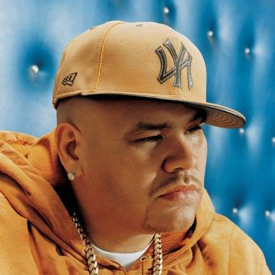
As a rapper, Fat Joe is just good on paper.
Sure, he’s got all the essential credentials to qualify for hip-hop honors. Joey Crack’s been in the game for 15 years, had a No. 1 song with “Lean Back,” is CEO of Terror Squad Entertainment, collaborated with everyone from Busta Rhymes to Ludacris and has even beefed with 50 Cent. But Fat Joe is music’s ultimate bandwagon hopper; he does not set trends, and his music, though it sells consistently well, is always a step behind. Case in point: The Elephant in the Room.
The 37-year-old Bronx native came to the game as Fat Joe da Gangsta, a rare Latino rapper who wasn’t much more than a novelty on DJ Premier’s beats. He embraced the grimy style of the early ’90s and blended in with Diggin’ in the Crates, an Uptown supergroup, for much of the decade. Around the same time, he was biting the style of his “twin,” the late Big Pun, a beast of an emcee. After Pun died in 2000, Joe blew – and, like most other rappers at the time, embraced the bling-bling and entrepreneurial spirit.
For Joe, though, this meant copying others – he got radio play for collaborating with R&B singer Ashanti, even though Ja Rule had done it before, and scored “Lean Back,” even though Lil Jon had already popularized “the Rockaway” on Usher’s “Yeah!” And now that many fans agree DJ Khaled is the best, Joe is all over the Miami producer’s tracks.
If hip-hop were a laboratory experiment, then Joe would be the dependent variable.
Although Joe’s latest and eighth solo release, The Elephant in the Room, is solid and features killer production, it also includes musical trends that have already been exhausted, and its lyrics are only slightly re-worked pieces for Joe’s previous albums. It’s not new; the old stuff is just sanitized.
Like on most of his other albums, Joe still proclaims he’s “Crack,” a metaphor turned motif turned annoyingly repeated phrase and featured prominently on “That White.” His mafia storylines and shout outs to John Gotti and Kenneth Supreme Griffin on “The Crackhouse” sound like elementary versions of Biggie lines. He even repeats already over-used rhymes, such as “I’ll bless you, achoo,” on the album’s opener, “The Fugitive.” Juelz Santana even rapped that lyric before Joe.
The recycling of cliché lyrics is constant throughout The Elephant in the Room. On “The Crackhouse,” a track in which Lil Wayne’s manic, bluesy hook outshines Joe’s verses, Joe even spits “make it rain … grab an umbrella, ella, ella.” It’s ironic that The Elephant in the Room includes a song called “You Ain’t Saying Nothin'” (which sounds way too similar to T.I.’s “I’m a King”); Joe maybe rather loquacious on his tracks but kicks nothing with substance.
But his flow can hold down the beats, which – thanks to an all-star cast of producers such Cool & Dre, DJ Khaled and The Alchemist – are definitely bangin’. Joe even sounds ferocious on “300 Brolic,” a menacing track with fighting words such as “I’m a professional, I will cut off your testicles.” “Preacher on a Sunday Morning” features a funky yet grittyguitar melody, while “K.A.R.” sets Joe up to spit some of the albums’ best rhymes. His tongue-twisting raps, such as “They plan to stop us and lock us and surround us with helicopters/ But Joey got hella rockets, propellers popping,” may make skeptics re-judge the album.
Other entertaining points on The Elephant in the Room are when Joe defends himself from critics. He bluntly insists he can say “n—-” on “The Fugitive” and then repeats it five times. He states he has undeservedly been slept on during “Preacher on a Sunday Morning” and even takes a shot at 50 Cent on “The Crackhouse.” “Convicts in my plane when we roll up/ And they hustle yay, not vitamin water,” Joe spits smugly.
The Elephant in the Room contains only one poppy R&B love song, “I Won’t Tell,” which coincidentally is the album’s first single. This is a standard formula for mainstream “thug” rappers: Sprinkle the CD with one or two crossover hits, and make the rest of the tracks street.
The Elephant in the Room exemplifies Fat Joe’s career: solid but unspectacular; popular but not innovative. Unlike what the title suggests, there is nothing that really stands out on this album other than Joe’s mediocrity.
arush@umd.edu
RATING: 3 STARS OUT OF 5



